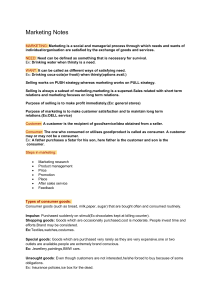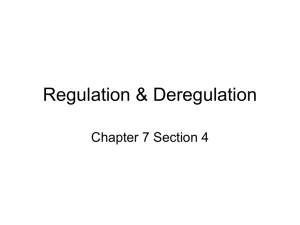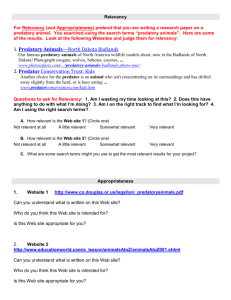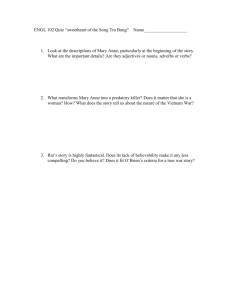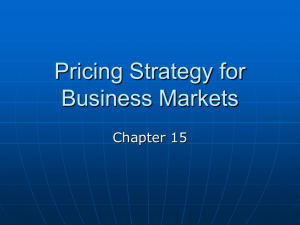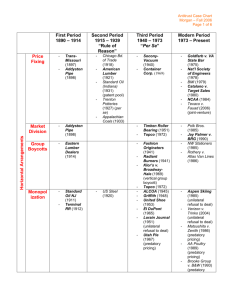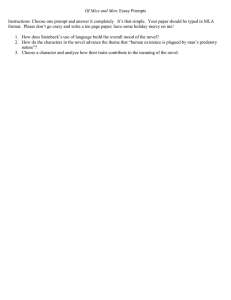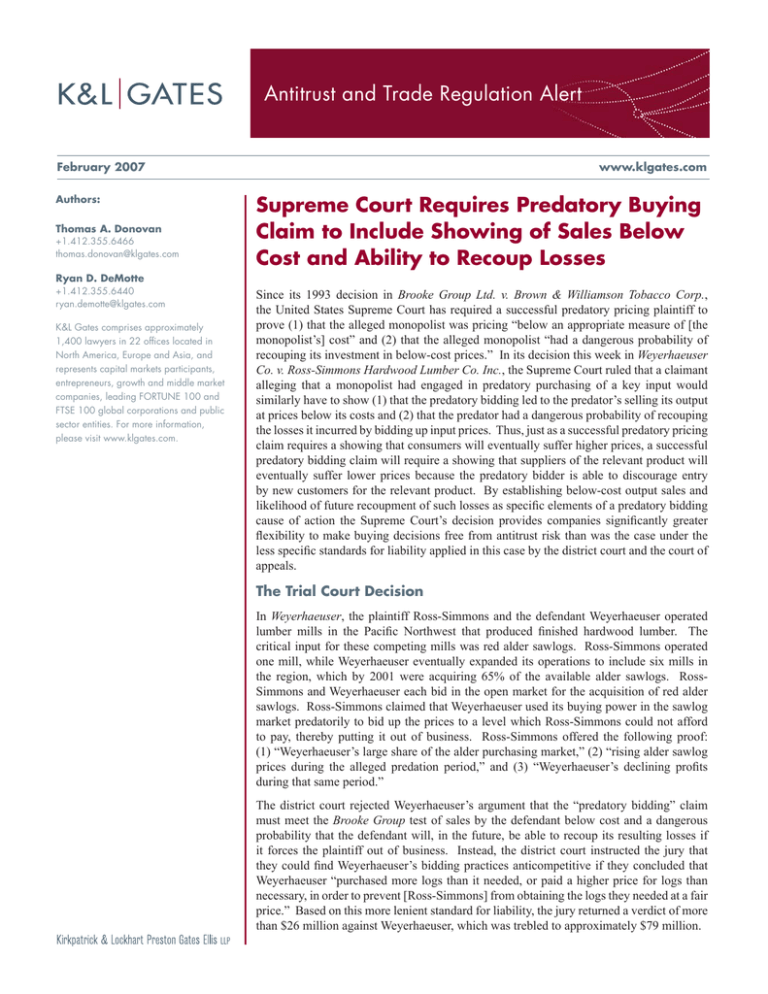
Antitrust and Trade Regulation Alert
February 2007
Authors:
Thomas A. Donovan
+1.412.355.6466
thomas.donovan@klgates.com
www.klgates.com
Supreme Court Requires Predatory Buying
Claim to Include Showing of Sales Below
Cost and Ability to Recoup Losses
Ryan D. DeMotte
+1.412.355.6440
ryan.demotte@klgates.com
K&L Gates comprises approximately
1,400 lawyers in 22 offices located in
North America, Europe and Asia, and
represents capital markets participants,
entrepreneurs, growth and middle market
companies, leading FORTUNE 100 and
FTSE 100 global corporations and public
sector entities. For more information,
please visit www.klgates.com.
Since its 1993 decision in Brooke Group Ltd. v. Brown & Williamson Tobacco Corp.,
the United States Supreme Court has required a successful predatory pricing plaintiff to
prove (1) that the alleged monopolist was pricing “below an appropriate measure of [the
monopolist’s] cost” and (2) that the alleged monopolist “had a dangerous probability of
recouping its investment in below-cost prices.” In its decision this week in Weyerhaeuser
Co. v. Ross-Simmons Hardwood Lumber Co. Inc., the Supreme Court ruled that a claimant
alleging that a monopolist had engaged in predatory purchasing of a key input would
similarly have to show (1) that the predatory bidding led to the predator’s selling its output
at prices below its costs and (2) that the predator had a dangerous probability of recouping
the losses it incurred by bidding up input prices. Thus, just as a successful predatory pricing
claim requires a showing that consumers will eventually suffer higher prices, a successful
predatory bidding claim will require a showing that suppliers of the relevant product will
eventually suffer lower prices because the predatory bidder is able to discourage entry
by new customers for the relevant product. By establishing below-cost output sales and
likelihood of future recoupment of such losses as specific elements of a predatory bidding
cause of action the Supreme Court’s decision provides companies significantly greater
flexibility to make buying decisions free from antitrust risk than was the case under the
less specific standards for liability applied in this case by the district court and the court of
appeals.
The Trial Court Decision
In Weyerhaeuser, the plaintiff Ross-Simmons and the defendant Weyerhaeuser operated
lumber mills in the Pacific Northwest that produced finished hardwood lumber. The
critical input for these competing mills was red alder sawlogs. Ross-Simmons operated
one mill, while Weyerhaeuser eventually expanded its operations to include six mills in
the region, which by 2001 were acquiring 65% of the available alder sawlogs. RossSimmons and Weyerhaeuser each bid in the open market for the acquisition of red alder
sawlogs. Ross-Simmons claimed that Weyerhaeuser used its buying power in the sawlog
market predatorily to bid up the prices to a level which Ross-Simmons could not afford
to pay, thereby putting it out of business. Ross-Simmons offered the following proof:
(1) “Weyerhaeuser’s large share of the alder purchasing market,” (2) “rising alder sawlog
prices during the alleged predation period,” and (3) “Weyerhaeuser’s declining profits
during that same period.”
The district court rejected Weyerhaeuser’s argument that the “predatory bidding” claim
must meet the Brooke Group test of sales by the defendant below cost and a dangerous
probability that the defendant will, in the future, be able to recoup its resulting losses if
it forces the plaintiff out of business. Instead, the district court instructed the jury that
they could find Weyerhaeuser’s bidding practices anticompetitive if they concluded that
Weyerhaeuser “purchased more logs than it needed, or paid a higher price for logs than
necessary, in order to prevent [Ross-Simmons] from obtaining the logs they needed at a fair
price.” Based on this more lenient standard for liability, the jury returned a verdict of more
than $26 million against Weyerhaeuser, which was trebled to approximately $79 million.
Antitrust and Trade Regulation Alert
The Court of Appeals Rejects the
Brooke Group Standards
The Ninth Circuit affirmed the judgment, rejecting
Weyerhaeuser’s Brooke Group argument. The Ninth
Circuit based its reasoning on what it perceived to be
the economic differences between predatory buying
in the input market and predatory pricing in the output
market. According to that court, “an important factor
distinguishes predatory bidding cases from predatory
pricing cases: benefit to consumers and stimulation of
competition do not necessarily result from predatory
bidding the way they do from predatory pricing.”1
Based on this rationale, according to the Court of
Appeals, the same concerns for chilling procompetitive
conduct that informed the Supreme Court’s Brooke
Group test do not apply to predatory buying.
The Supreme Court Likens the
Economics of Predatory Bidding to
Those of Predatory Pricing
The Supreme Court reversed the Ninth Circuit
decision, concluding that “predatory bidding” claims
were “analytically similar” to predatory pricing claims
and thus should be subject to the Brooke Group test.
Citing the symmetry in the economics of monopsony
(buy-side power) and monopoly (sell-side power), the
Court stated that “[b]oth claims involve the deliberate
use of unilateral pricing measures for anticompetitive
purposes” and “logically require firms to incur
short-term losses on the chance that they might reap
supracompetitive profits in the future.” In addition,
according to the Court, rational businesses will be
no more likely to make this sacrifice for “predatory
bidding” schemes than they would be for predatory
pricing schemes. Such schemes are “rarely tried,
and even more rarely successful.” Also, just as in
predatory pricing, “predatory bidding” actions are
often procompetitive. The Court cited a variety of
legitimate procompetitive justifications for a buyer to
bid up input prices, such as attempting to gain market
share based on increased efficiency, changing to a
more input-intensive production process, and hedging
against future supply fluctuations. Further, a failed
predatory bidding scheme, like a failed predatory
pricing scheme, may be beneficial to consumers,
according to the Court. The initial high prices are
likely to lead to the acquisition of a higher volume
of inputs and, therefore, result in a higher volume of
output and lower output prices.
Accordingly, the Court held that to establish a
predatory bidding claim, a plaintiff must prove that
the buy-side bidding resulted in below-cost pricing of
the defendant’s output. If plaintiffs were permitted
to impose antitrust liability for predatory purchasing
where the alleged predator had not engaged in belowcost pricing, the Court reasoned, the risks of deterring
legitimate procompetitive behavior would outweigh
the economic benefits. Secondly, the claimant must
prove there is a dangerous probability that, if the
predator is successful in forcing out its rival purchaser,
entry into the market will be so restrained the predator
will be able to recoup its earlier losses by paying lessthan-competitive market prices for its future purchases
in the relevant input market.
Conclusion
Just as few plaintiffs have been able to overcome the
courts’ skeptical attitude toward predatory pricing
cases since Brooke Group, few claimants will likely
be able to sustain a predatory purchasing claim, either
at trial or on a motion for summary judgment.
1 Ross-Simmons Hardwood Lumber Co. Inc. v. Weyerhaeuser
Co., 411 F.3d 1030, 1037 (9th Cir. 2005).
K&L Gates comprises multiple affiliated partnerships: a limited liability partnership with the full name Kirkpatrick & Lockhart Preston Gates
Ellis LLP qualified in Delaware and maintaining offices throughout the U.S., in Berlin, and in Beijing (Kirkpatrick & Lockhart Preston Gates Ellis
LLP Beijing Representative Office); a limited liability partnership (also named Kirkpatrick & Lockhart Preston Gates Ellis LLP) incorporated in
England and maintaining our London office; a Taiwan general partnership (Kirkpatrick & Lockhart Preston Gates Ellis) which practices from
our Taipei office; and a Hong Kong general partnership (Kirkpatrick & Lockhart Preston Gates Ellis, Solicitors) which practices from our Hong
Kong office. K&L Gates maintains appropriate registrations in the jurisdictions in which its offices are located. A list of the partners in each
entity is available for inspection at any K&L Gates office.
This publication/newsletter is for informational purposes and does not contain or convey legal advice. The information herein should not be
used or relied upon in regard to any particular facts or circumstances without first consulting a lawyer.
Data Protection Act 1998—We may contact you from time to time with information on Kirkpatrick & Lockhart Preston Gates Ellis LLP seminars
and with our regular newsletters, which may be of interest to you. We will not provide your details to any third parties. Please
e-mail london@klgates.com if you would prefer not to receive this information.
©1996-2007 Kirkpatrick & Lockhart Preston Gates Ellis LLP. All Rights Reserved.
February 2007 | 2

